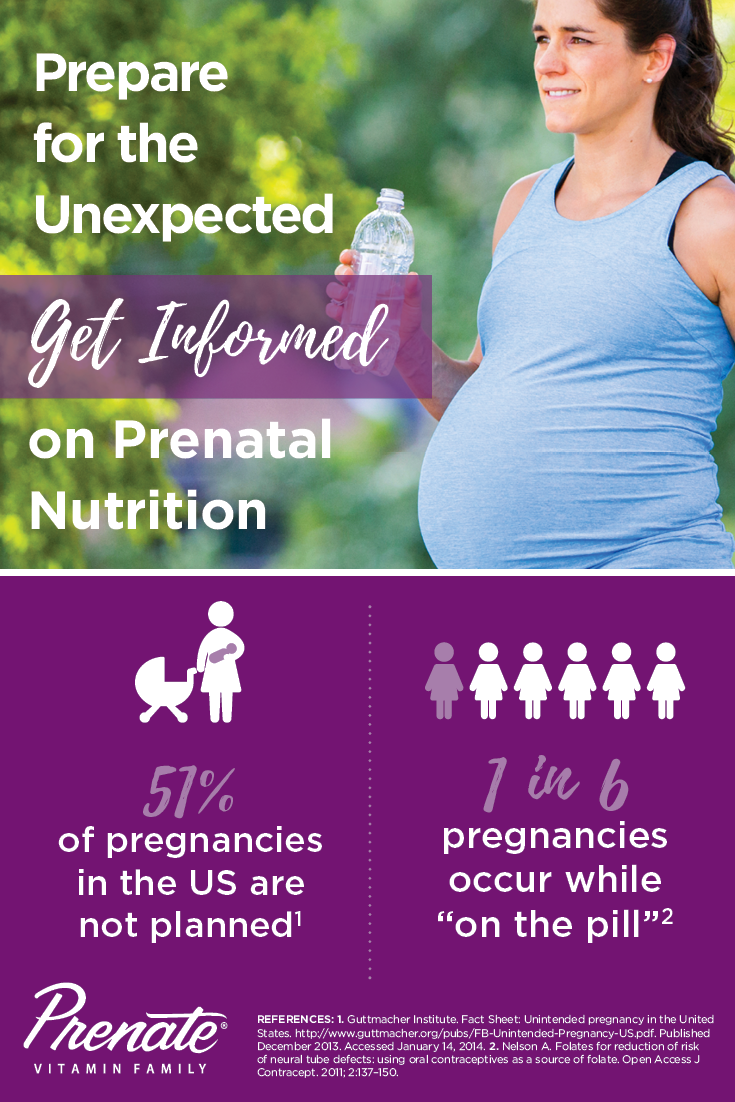Get Informed on Prenatal Nutrition
March 1, 2017
If you’ve come across this blog, chances are you are thinking about becoming pregnant…or may even already be pregnant. In either case, it is never too early to get informed on prenatal nutrition.
In fact, 51% of annual pregnancies in the United States are unintended or not planned.1 And reportedly one is six pregnancies, nearly 1 million each year, are estimated to occur in women who report using oral contraceptives.2 This means that women of child-bearing age should educate themselves on proper parental nutrition because they may be faced with a surprise pregnancy.
But even women who may be planning a pregnancy may not be as informed as they should be as to the critical role that certain nutrients play in early pregnancy.3 One of the most critical nutrients in early pregnancy is folic acid. This form of folate plays a key role in supporting the development of a baby’s brain and closure of the neural tube, which is the precursor to the central nervous system.4,5 The neural tube eventually becomes the baby’s spine. The development and closure of the neural tube occurs between day 14 and 28 of pregnancy.6
Taking prenatal vitamins one month before conception can help a woman build reserves of folic acid and other important nutrients. Designed for the needs of both mothers and babies, the Prenate® Vitamin Family helps fill nutritional gaps unable to be met by diet alone. In addition to taking a daily prenatal vitamin, women should look to align their diet with proper prenatal nutrition recommendations.
Thankfully good prenatal nutrition is similar to the same recommendations that one should follow for a balanced diet and overall health. Generally speaking, women should consume 2,000 calories a day through preconception and the first-trimester to maintain a healthy weight. This should be made up of fruit, vegetables, dairy, whole grains and lean protein. In addition, women should limit sodium, saturated fats, added sugars and alcohol.
If you are over-weight or under-weight the caloric intake would vary. Similarly the amount of each food group is dependent on your age and activity level. If you’re not sure how much of each food group to each, the US Department of Agriculture provides online calculate to find the daily checklist of your specific food group goals. You can find it here: https://www.choosemy- plate.gov/myplate-daily-checklist-input/spanish
If these guidelines seem way off-base from your current habits, don’t worry. Small changes over time can form the foundation of new health habits. Here are some tips to help you adjust your nutrition and lifestyle:
- Create an eating style with a variety of healthy foods
- Cook meals at home when possible with healthier foods
- Practice portion control. Quantity is just as important as food quality.
- Find a variety of activities that you enjoy. Mix it up and get active most days of the week.
- Consult with your healthcare provider or a dietician to find a nutrition plan that works for
your lifestyle and health needs.
You Are About To Leave This Website
By clicking continue, this link will take you to a website to which Alora Pharmaceuticals Policies & Terms of Use do not apply. Alora and its subsidiaries do not control the content or accuracy of third-party websites and assume no responsibility for their use.
















